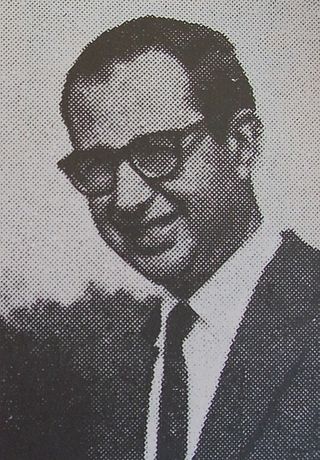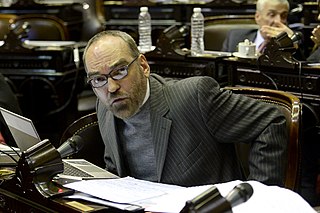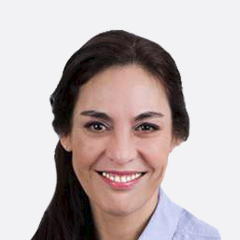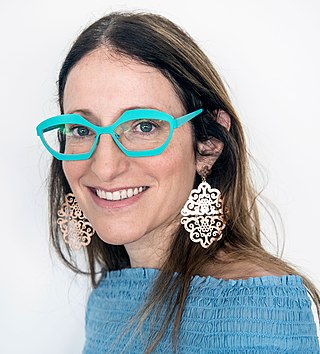
Luisa Valenzuela Levinson is an Argentine post-'Boom' novelist and short story writer. Her writing is characterized by an experimental style which questions hierarchical social structures from a feminist perspective.

Ricardo Luis Lorenzetti is an Argentine judge graduated from the National University of the Littoral, Argentina, with a long national and international career. He used to be Chief Justice of the Supreme Court of Argentina (2007–2018), proposed by President Néstor Kirchner and approved by the Senate, assuming his position on December 12, 2004, covering the vacancy caused by the resignation of Justice Adolfo Vázquez. On November 7, 2006, he was appointed Chief Justice, officiated as of January 1, 2007. Currently, he is one of the five Justices of the Supreme Court. He was President of the Commission for the preparation of the Parliamentary Act to reform, update and unify the Civil and Commercial Codes of the Argentine Nation, Presidential Decree 191/2011.

Carlos Andrés Escudé Carvajal was an Argentine political scientist and author, who during the 1990s served as special advisor to foreign minister Guido di Tella. As such, he advised on Argentine foreign policy strategy vis-à-vis the Western powers particularly in the wake of the Falklands War.

Noé Jitrik was an Argentine literary critic.
Jaime Castillo Velasco was a Chilean politician who served as president and vice-president of the Christian Democrat Party on several occasions.

Eduardo Montes-Bradley is an Argentine-American filmmaker known for his documentaries films Evita, Rita Dove: An American Poet, and Harto The Borges. His most recent films are Black Fiddlers and Daniel Chester French: American Sculptor He’s currently working on The Italian Factor: The Piccirilli Story.
Alejandro Rozitchner is an Argentine writer. "Artist of the ideas" or "intellectual nutritionist" are some of the names with which he describes his work. He is characterized by his affirmative thinking, his appreciation for enthusiasm, and for his open, casual, and provocative style.

Ricardo Guillermo Maliandi Argentine writer and philosopher, devoted to ethics.
Gregorio Selser was an Argentine journalist and historian. He published an extensive bibliography critical of globalization, imperialism, and covert operations implemented by the CIA in Latin America, in particular.
The Argentine Constitutional Reforms of 1949 were approved during Juan Domingo Perón's government. This new constitution was a major revision of the Constitution of Argentina. Its goal was to modernize and adapt the text to the twentieth century's concepts of democracy, with a bill of social rights, including better working conditions for the working class, right to education, etc. It also allowed for the indefinite reelection of the president.

Carlos Cossio was an Argentinian militant university reformer, jurist, lawyer, legal philosopher and professor. One of his most important works is the concept of the Egological Theory of Law.

Bolivian Argentines are Argentine citizens of Bolivian descent or Bolivia-born people who immigrated to Argentina. In recent decades, Bolivia has become one of the main sources of immigration in Argentina, making Bolivians one of the largest Hispanic American immigrant groups in Argentina, along with Paraguayans, Peruvians and Venezuelans.

Alejandro César Agostinelli is an Argentine writer, journalist, screenwriter and TV producer.

Marta Lynch was the pseudonym of Marta Lía Frigerio, an Argentine writer. She wrote seven novels and nine collections of short prose.

Intersex people in Argentina have no recognition of their rights to physical integrity and bodily autonomy, and no specific protections from discrimination on the basis of sex characteristics. Cases also exist of children being denied access to birth certificates without their parents consenting to medical interventions. The National Institute Against Discrimination, Xenophobia and Racism and civil society organizations such as Justicia Intersex have called for the prohibition of unnecessary medical interventions and access to redress.

Mónica Weiss is an Argentine illustrator, artist, writer and architect. She has illustrated more than 140 books and has actively worked for the rights of illustrators and to show the importance of illustration in Argentina.

Fernando Adolfo Iglesias is an Argentine journalist, writer, politician, and volleyball player. Currently he is a National Deputy elected in Buenos Aires. He is a member of the center right party Republican Proposal.

Ana Carla Carrizo is an Argentine political scientist and politician, currently serving as National Deputy elected in the City of Buenos Aires since 2013. She is a member of the Radical Civic Union (UCR).

Argentine cheese is by far the most produced dairy product in the country, making Argentina the second largest cheese producer in Latin America and among the top 10 cheese-producing countries in the world. In addition, Argentina is the Latin American country that consumes the most cheese, with 12 kilos per capita per year. Production is mainly centered in the provinces of Córdoba, Santa Fe and Buenos Aires, in the Pampas region of the central and east-central parts of the country.

Mariela Belski is an Argentine feminist lawyer and human rights activist. As an activist, she promotes the defense and exercise of the rights of women and young people. She is an ambassador for #EllaDecide (#SheDecides), the global women's rights movement. Since 2011, she has served as executive director of Amnesty International Argentina.
















